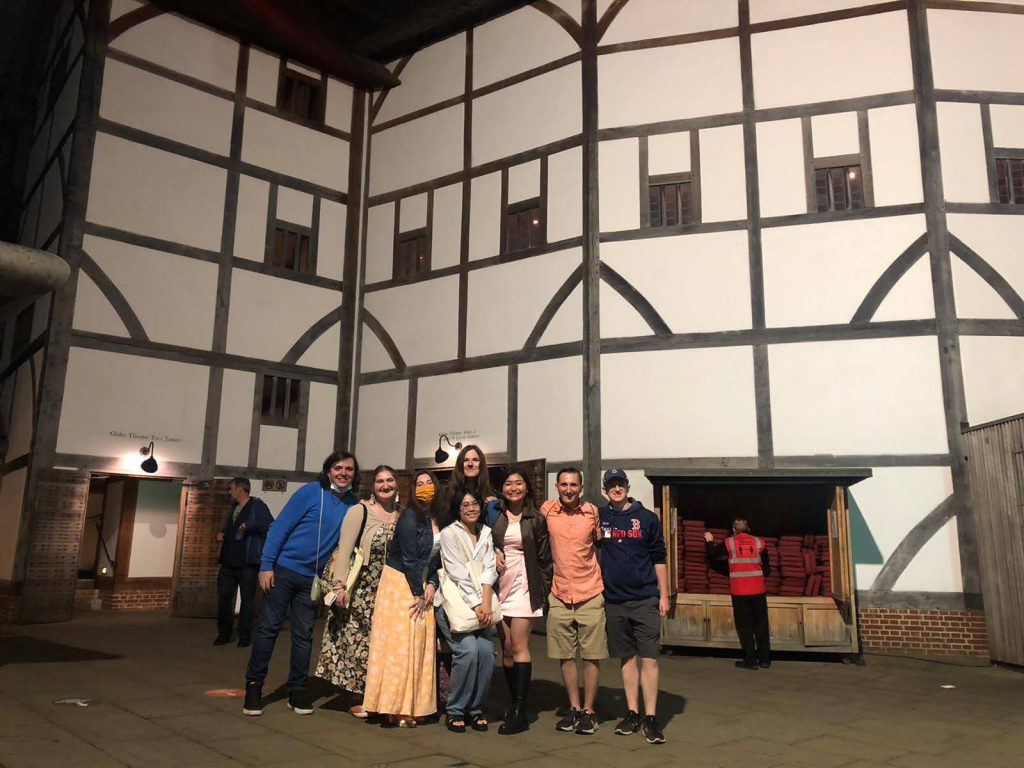If I could go back a few weeks and prepare better for this trip there’s a lot of things I would put into consideration, starting with the style of clothes that I packed for this trip. I started planning for London with the hope of it being very warm most of the days even though I knew London isn’t known for being very hot and has spurts of random rain but I was blinded by the summer vibe and bought a ridiculous amount of shorts that won’t get to be worn till I am back home. I actually only got to wear shorts one of the days that I was here and it ended up raining. Luckily I overpacked and had enough pants to get me through. Another thing I would have told my old self to better prepare for was to convert my US dollars to pounds weeks before I left because I tried to do it on the last day and ended up having to swipe my hard the whole time which made my cash useless.
Monthly Archives: June 2022
My Shakespearean Experience in London & Stratford-upon-Avon
One of the highlights of the trip is the privilege to see a live performance of Shakespeare’s work. When the group and I found out that the Royal Shakespeare Company (RSC) in Stratford-upon-Avon were performing a rare adaptation of Shakespeare’s Henry VI, part III (teased as the Wars of the Roses), I was shocked. I had to raise my expectations as I felt that there is a reason why this performance is rare.
I am typically not someone who would buy tickets to live theater (or as they spell it everywhere not named the US, theatre). I feel that this trip had the ability to change that, and it certainly lived up to the hype.
(Warning: mentions of gory scenes ahead)
After watching Wars of the Roses, my expectations seemed like a low bar. The RSC blew threw my expectations. The play featured some gory scenes as there is a lot of death involved. They did an impressive job making everything look realistic while using a lot of props and fake blood. What made the experience more interactive was that characters would enter the stage from the stands! As a bonus, my seat was right next to the stage! The show, actors, and plot were so good that I would watch this again (or any other play performed by RSC) in a heartbeat.
A few days later, in the Bankside area of London, Shakespeare’s Globe (a recreation of Shakespeare’s original Globe Theatre) performed the comedy Much Ado About Nothing. It has been thought that standing tickets right in front the stage offered the best experience, but I have to disagree. I found it extremely difficult to pay attention to what was going on because it was too crowded for my liking in the area. If I had the opportunity to upgrade to a box seat (which I am certainly willing to when I return), my experience would be different.
I found it strange that the Globe crew decided to have a Shakespearean play set in the 1940s. I think they thought this was best so that it would make it easier for the audience to understand the jokes. By the way, the cast also interacted with the audience quite a bit here as well, pointing at random spectators in front of the stage. The show made everyone laugh at some point.
I must say that based on watching a history play and a comedy play by Shakespeare, I think the history play was much better. Even though the background was difficult to interpret at first, there seemed to be a myriad of action between fights, death, and arguing. I’m still a fan of comedy- but my experience watching a comedy play was unfortunately hampered by my experience at the venue. The history plays also seemed to have themes relevant to modern politics, which should be important to everyone, regardless of major.
Overall, after the two weeks in England, I must say that Shakespeare is a god. He is everywhere and people do not realize it. Everything on TV, the news, even real life, relate back to Shakespeare in some way. A lot of the more famous quotes and saying go back to Shakespeare. I’ll leave this post with a well-known quote from Hamlet: “To be or not to be, that is the question”
Henry VI: Taking New Strides To Future Shows
By: Lizzy Staugler
I have seen quite a few stage performances in my lifetime, from the smallest of stages in my high school, to the bigger ones in Boston. However, of the ones I have seen there was only one other play that had an actor performing on the stage that had a visible disability playing the role of a character who wasn’t originally written to have one. Two different shows taking that leap into pushing shows passed their comfort zones.
While Henry VI is the second play I’ve seen taking this leap, it’s just as important, and stood out just as much, if not more, as the first play I saw that did this. I saw To Kill A Mockingbird where one of the characters was played by a deaf actor, however this character didn’t come out until later, and wasn’t seen very much throughout the play. Comparing this to Henry VI where a main character, Richard The III was played by someone with a disability shows just how great representation has grown. Also the fact that throughout the performance they didn’t just ignore the fact that the actor playing Richard The III had a disability but instead just showcased it and made it a part of the character really just proves that anyone can act on stage. This is such a step in the right direction for plays and musicals. I can only hope to see more of these actions being taken place in the near future
Looking to the Past to Look Ahead
An interesting concept that Professor Petersen introduced during our trip was the idea that Shakespeare used his many historical productions as a way to question the future of rulership in his time. Before this trip, my knowledge of English history was a bit hazy, I knew some of the names of English rulers, but I did not really know who each was and their basic stories. After having spent a week or so learning about these rulers through Shakespeare’s plays, I think it is intriguing to examine the lasting ideas about leadership and royalty from these plays that remain relevant today. Henry VI Part Three features three kings (one who is crowned after the events of the play); each is quite different, but none of them last.
With all of this said, I think that Shakespeare’s time of uncertainty regarding royalty and kingship mirrors the modern occasion with the royal family and politics of the United Kingdom. Right now, the royal family is deeply unpopular and mired in numerous scandals and issues; meanwhile, the Prime Minister is a seemingly shameless figure who is facing much public disapproval yet clings to power. All of this is set against the backdrop of the Platinum Jubilee for Queen Elizabeth II, a huge and costly celebration of the 70th year of her reign.
Maybe we, like Shakespeare did in his time, need to examine our expectations and wants for royalty and leadership. During his time, the ruler was Queen Elizabeth the First, the virgin queen, who made it illegal to talk about the line of succession towards the end of her reign. So, Shakespeare, in a way, used his historical plays to ask what qualities should be wanted of royalty and leaders. Now, as London celebrates 70 years of Queen Elizabeth II’s reign, the United Kingdom again ponders what they want of their royalty. Should the leader of the UK be strong and militaristic like Henry V? Nonviolent and refined like Richard II? Or something else? With the figurehead position of modern royalty in the UK, the question of their basic worth is also called into question. In conclusion, I would say that despite my initial misgivings, I have found Shakespeare’s histories to be a very revealing look into his time and the worries and thinking that accompanied it. His plays have lasting relevance to current day United Kingdom and continue to incite important conversations and questions.
Reflection: What I could have done to better prepare myself for this trip
Going on vacations/trips away from home can be intimidating, if you look at the smaller things, such as what to pack or how to prepare. Every trip I take, I feel like I do something wrong in one of those areas, with this trip being no exception. Here are a couple of things I feel that I should have done better:
1. Pack more patience
Coming from the Boston area, it seems like a lot of people (myself included) have some lack of patience. This seems to be particularly evident while driving in the area- you will get honked at for not going on a green light a mere second after it turns green.
The first thing that made me think about this was when I ordered food from a sit-down restaurant. I was thinking to myself, “It’s just something simple, fish and chips, why is it taking so long? They get many orders for this throughout the day, why is it mine in particular that has a long wait time?”
It turns out that this seems to be one of the main differences between North America and Europe. It had been four years since I traveled to this region, but that was when I was younger and didn’t really care for my time as much as I do now. I should have known better about this- even the washing machine and oven take much longer to do their job here than back home. Clothes dryers are rare here, so I would have to hang everything up on a rack for clothes to dry. This will obviously take some time.
2. Take only what you need- not your entire wardrobe
This seems like common sense- but I regret packing a weeks’ worth of clothes (which is about 2/3 of my entire wardrobe) on this 2-week long trip (I am going on to Ireland for another week after the London trip is over). Like I said about the laundry previously, it will take a while to “turn around” a pile of dirty clothes by washing and drying them.
I got lucky when I measured my bag at the airport- it was under the 50 pound (23 kg) limit by quite a bit. The bag seemed too full inside with all of my clothes- but there might be room to spare with gifts to take home. (I don’t usually buy gifts when going on vacation- I find it to be a waste of money)
I ended up (so far) using only about 4 days’ worth of clothes at a time and washing them as soon as I get a chance to do so- keeping everything fresh. I feel like this is very dependent on the clothes you typically wear- for me, it’s quite simple, a long-sleeve shirt and a pair of jeans. However, you might want to bring something nice to wear for theater (which there is no shortage of in London).
Overall, I hope these tips will come in handy for anyone who reads them, even if it’s me several years down the line.
How London has preserved its history
London is a very historical place. For nearly a thousand years, London has been the home of the English monarchy, which eventually came to control the whole island. I have visited two major historical buildings during my London trip: Westminster Abbey and the Tower of London. The former is where monarchs have been coronated for over a thousand years; the tradition still continues today. The latter is where several important people were executed in order for monarchs to solidify their claims to the throne. How well have these two important historical sites been preserved?
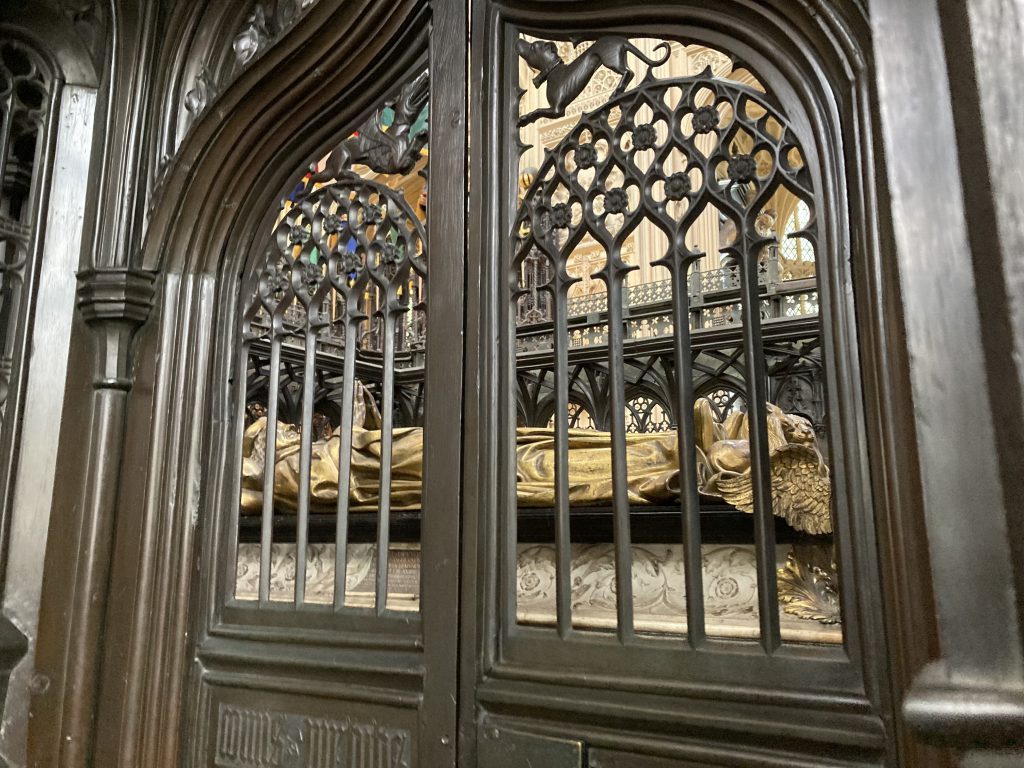
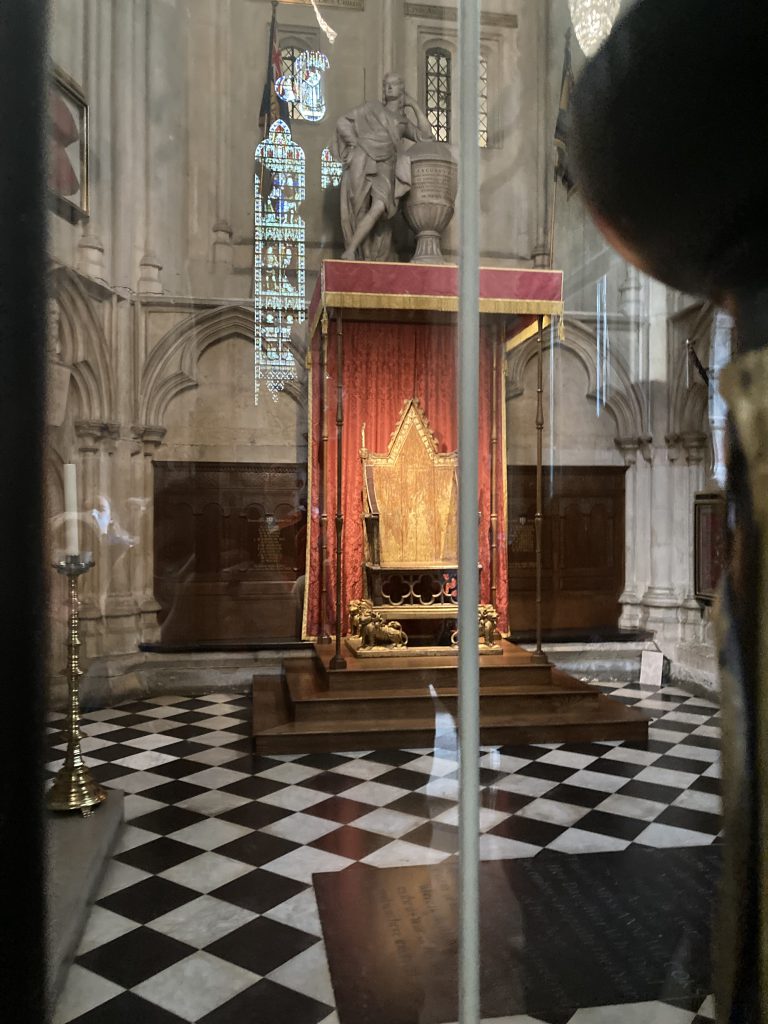
In Westminster Abbey, everything is well preserved. It has the tombs and effigies of monarchs in the past, as well as plaques honoring other important people like Isaac Newton. The most significant part of it in my mind was the Coronation Chair because most English monarchs have sat on it. I could feel the historical significance of Westminster Abbey during my visit.
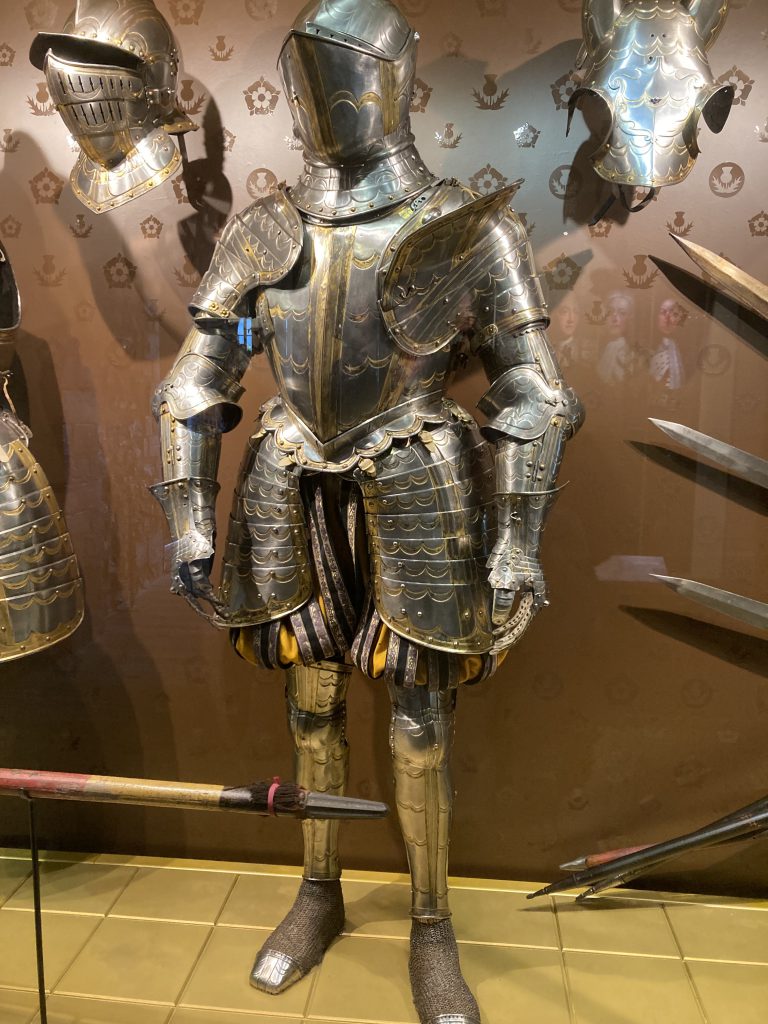
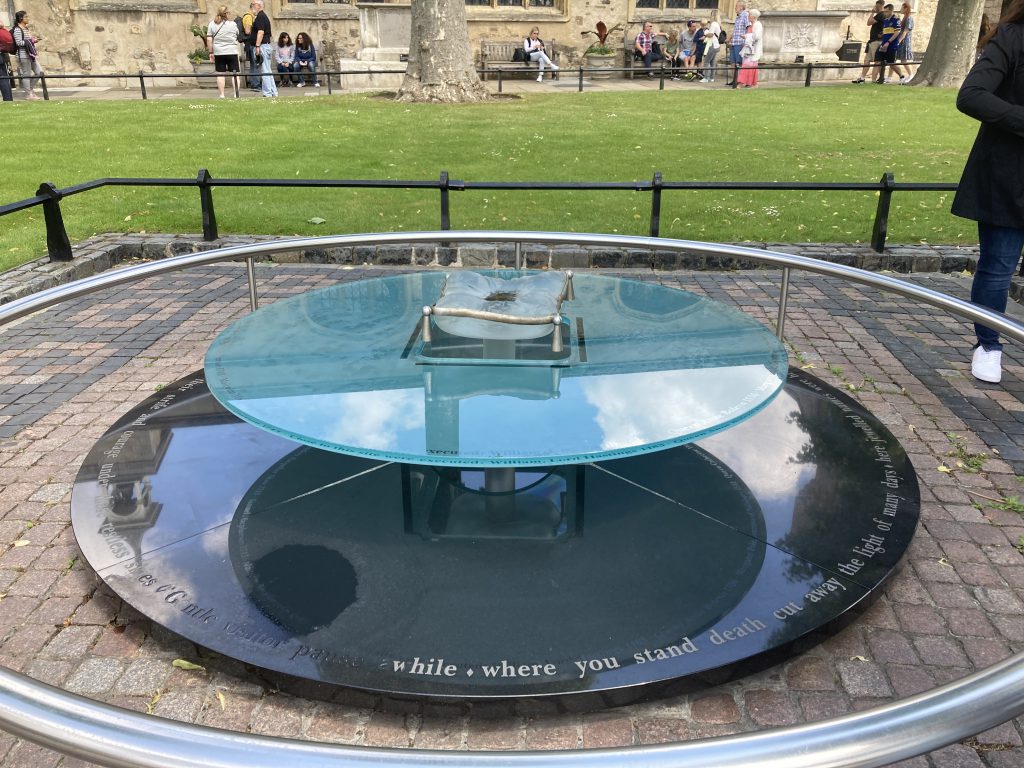
I was excited to visit the Tower of London because of the numerous members of the royal family that died there. I got some of the historical appreciation that I wanted. The monument put in place for the executions is in very good taste. However, I was a bit disappointed that the rest just feels like another tourist attraction. The armor and weapons put on display are very nice, but it detracts form the historical significance of the area. The Tower of London could have been better preserved.
War of the Roses: Not Just Your Average Play
Although I’m a fan of Shakespeare, I’ve always been very hesitant about the histories. Prior to any exposure, I assumed that history plays would be boring, hard to understand, and irrelevant to me. Already Shakespeare’s language can be a bit difficult to take in, but I figured that having many similarly-named kings, and a lack of knowledge about British politics would make the history plays completely inaccessible to me. After seeing Henry VI, I see how incorrect those assumptions were.
I thoroughly enjoyed the performance and felt engaged the whole time. I was able to mostly follow the story, and I could hardly believe how fast the three-hour-long performance passed. I have never seen another performance quite like this. It felt like I was watching a movie unfold in front of my eyes.
The physical theater space of the Royal Shakespeare Company played a large part in this. The small circular room created a more intimate atmosphere, with the audience hardly separated from the action. The actors created emotional tension and drama, which was heightened by their proximity to the audience. They blurred the boundaries between watching a performance and experiencing a story as part of the action.
I really appreciated how this play established a narrative behind the history. I could see multiple perspectives of how and why this conflict. This play helped me could see how the personal relationships and emotions of people in power influenced the War of the Roses, and contributed to political instability.
History in London and Stratford-Upon-Avon
After spending a few days in both London and Stratford-Upon-Avon, it has become obvious that both cities are deeply involved in their histories. When looking at a map of London, you can rarely go much farther than a few blocks before finding either a historical site or a museum. History is engrained into a majority of the buildings in London as well as all of its people. On Thursday, June 2nd, I was walking through Piccadilly Circus with some of my classmates when we noticed that everyone around us had stopped and looked to the sky. A line of helicopters, jets, bombers, and other aircraft paraded across the sky for approximately 5 minutes. The entire time, people on the street cheered and celebrated. This was all to celebrate the Queen’s Platinum Jubilee. Along with the flyover, there was a parade, and thousands of people packing the streets of London in celebration. This celebration represents how important history is to the people of London. Even though the Queen is largely ceremonial in the modern-day, the people of England still celebrate it.
The importance of history can also be seen while exploring Stratford-Upon-Avon. From Shakespeare’s Birthplace to the Royal Shakespeare Company to the Shakespeare ice cream boat, Shakespeare’s life has ingrained itself into the town. All around, people are exploring Shakespeare’s past through his old homes, his plays, and even his burial site. The history of England is still very much apparent within its cities no matter the size. The people of England embrace their history and display and celebrate it to its fullest.
Staying in London – Lessons Learned From Study Abroad
By: Allison Lam
Nothing has ever felt more surreal than traveling to London. Personally, I’ve only ever traveled with my family. I was always scared to go anywhere too far without my parents. Truthfully I’m not that knowledgeable about anything involving travel. Not only that, but I have traveled out of the country only one other time when I was young. So of course it was obvious that I was definitely not completely prepared for the trip.
I always try to take precaution, and my parents are very protective of me. We all tried to make sure I was fully prepared to go on my trip. Though, if I could go back and to give myself advice, I would probably mention a few things. First off, to pack more warmer clothes. It was to my understanding that the weather in London would be nice enough that I wouldn’t need to pack any warm clothes. However, seeing as London’s weather can change rapidly whenever it wants (a tour guide mentioned that this was normal for London weather), I find myself often stuck feeling a bit chilly with all the shorts and short sleeved shirts I packed.
I would also tell myself traveling without my family can be sad at times. I was so excited to be traveling on my own for once, having my own responsibilities and rules. But even though I was used to being without my parents (thanks to dorming), there were a lot of times so far into the trip where I would miss them. If I could go back, I would tell myself that it was good to be excited, but to remember to talk to my parents as much as I could, whether it was on text or through call. Because while traveling for study abroad can be fun and interesting, it can also feel a bit lonely at times.
What I Wish I Would Have Known Before Coming to London
Given that this study abroad trip was the first time that I have left the United States, especially without knowing anyone, I was understandably nervous in the days leading up to this trip. Waiting in the airport for the plane was agony, as was the tube ride from the airport to our flats. Even before then, when I was packing, I meticulously checked over my list I made to ensure I had everything I needed. However, after an admittedly bumpy start, I have assuaged those worries and feel much more comfortable.
One of my biggest worries about going on this trip was the fact that I did not know anyone, and that this would be the first extended period of time where I would be without family. I would have told my previous self to not worry about it, as I would eventually find a great group of people. I am extremely thankful that I am now comfortable, and that the group is kind and fun to be around. Many of the adventures and sightseeing that I have done have been with the other students in the group, and I honestly do not think that this trip would be as fun without them.
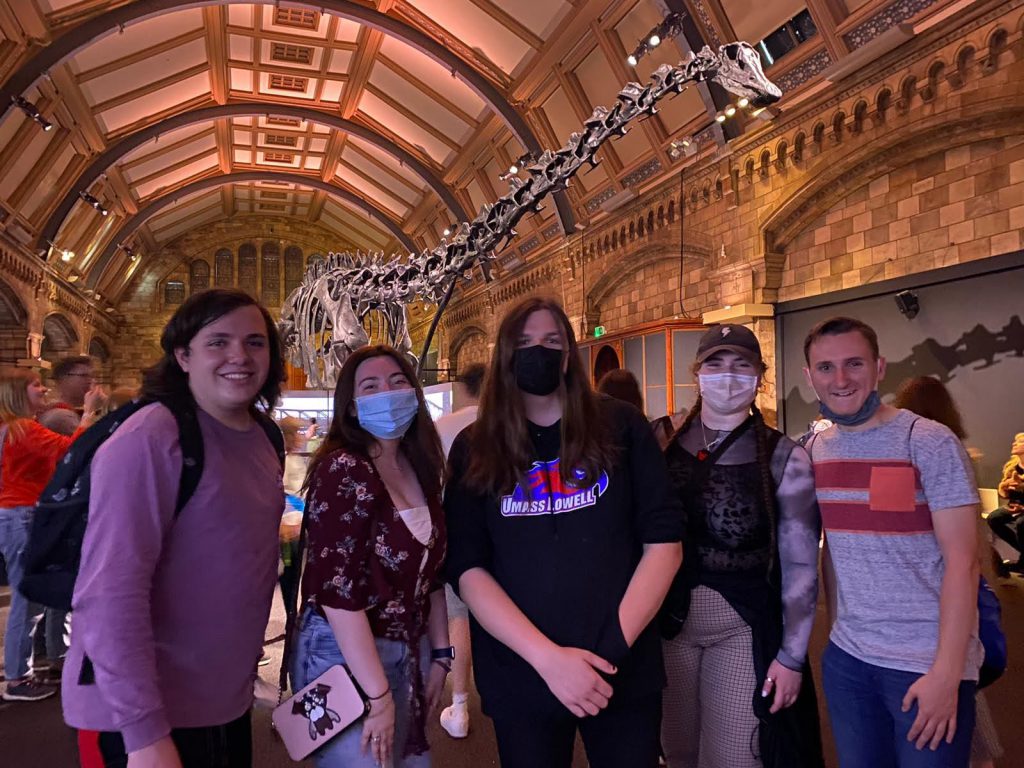
Another thing I wish I could tell myself before I left for this trip is to just lean in and have fun. I am a very anxious person by nature, and, as previously mentioned, I was anxious leading up to the program start. It took me a bit to figure out the bumps, but I eventually learned that doing things outside of my comfort zone can have great results. For example, I accompanied friends on trips that might have been something I wouldn’t have done otherwise and tried some foods that I have never had before. As well, if this were not a Shakespeare-based program, I find it unlikely that I would have gone out of my way to see The War of The Roses and Much Ado About Nothing, but I was pleasantly surprised when I did see them. For me, this whole trip has been about getting out of my comfort zone, and once I got over the early bumps, I was able to just lean in and have fun. I know that I will be happy with all that I have done once this trip is over.
